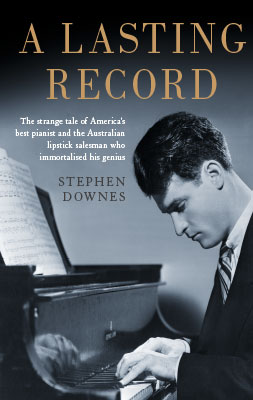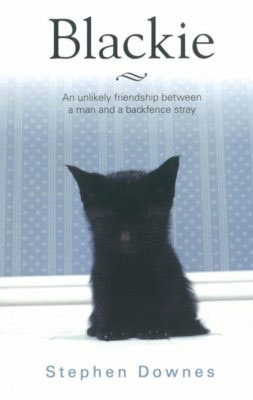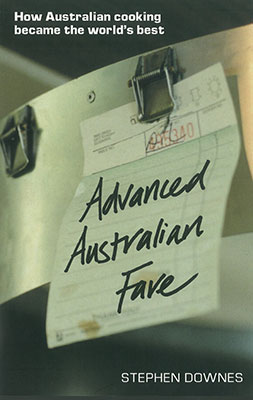
A Lasting Record
(HarperCollins 2013)
This is the strange tale of the life and death of one of the world’s greatest concert pianists. A neurotic Jewish New Yorker, William Kapell died in 1953 in an air crash on his way home from an exhausting tour of Australia. But A Lasting Record is a quirky story: a Melbourne lipstick salesman cut a disc of Kapell’s last performance on amateur equipment at home. His raw material was a radio broadcast, and the recording, eventually bootlegged, immortalized Kapell’s genius. Pulitzer-prize-winner Tim Page called the book ‘fascinating’. It was ‘scholarly, impassioned and good storytelling’. Richard Egarr, director of the Academy of Ancient Music, called it a ‘thoroughly engaging book’, a ‘must’ for any musician’s bookshelf. Jerome Lowenthal of New York’s renowned Juilliard music school called it a ‘splendid new biography’. Maurie O’Connor in FOOD WINE TRAVEL wrote that there are ‘many intriguing threads to this story and Downes weaves them together in a way that makes you wonder at the phenomenon of chance in our lives’.

Blackie
(Knopf 2003)
Though fewer than 200 pages, Blackie is the hardest piece of extended writing I've done. It’s about the life, illness and demise of one of our family cats. Blackie had a brain tumour removed – unusual enough for a pet, I suppose – and I felt especially responsible for nursing him back to life. Unfortunately, he didn’t recover, which devastated me but gave me the chance to write in more depth about the responsibilities of carers towards pets and what animals bring to our lives. It was hard work, and the front of my t-shirt was often stained with tears. My friend Jeff Masson, one of the world’s best writers about animals and their psychology, called Blackie ‘deeply moving...honest and courageous’… Jeff wrote without needing a cheque in the mail. Blackie has been translated into Italian, Dutch and Greek. Colin Climo in ‘The Bulletin’ said the narrative was ‘a compelling tale that is ultimately transformed into as honest and searching a self-analysis as any writer would be prepared to undertake’. John Morrow in the ‘Armidale Express’ called Blackie ‘my pick for 2003!’ It was the best book he’d read about the love between humans and animals, and the writing was ‘beautiful’. For Sascha Perry, Blackie was a ‘compulsive read’.

Paris on a plate
(Murdoch Books 2006)
A ‘gastronomic’ diary of a dozen days in the French capital, Paris on a plate leans heavily on nostalgia about – and memories of – my early years living in Paris, where I worked, fell in love, and got married. But underpinning these memories and observations of the street life of a great city is my meal-by-meal inventory of that fortnight. I eat at three great restaurants, several famous ones and a few that are downright ordinary. The book also outlines how the restaurant business has changed in France and the effect of big money on France’s alleged leadership in things culinary. Readers have loved Paris on a plate.

To Die For
100 food experiences to have before you die
(Pier 9 2005)
The sub-title says it all. This book was such terrific fun to write. And so easy. I simply dredged my memory for the best things I’ve ever eaten. In a blitz of about three-quarters of an hour, I jotted down the first 70 or so. I break up the experiences into those that you must go to specific restaurants to enjoy, those that can be easily cooked at home, dishes that require a little more effort, and ‘Perfect 10s’ or ingredients – such as a home-grown tomato – that scream their transcendence. The book is packed with anecdotes about how I came to discover these essential gustatory experiences. There is even a story about the erotic potential of a ripe mango. In ‘The Morning Advertiser’, Mark Taylor called To Die For an ‘entertaining, often quirky read’ full of ‘sound advice’. It deserved the shelves of ‘armchair foodies and serious chefs alike’.

Advanced Australian Fare
(Allen & Unwin 2002)
This book is to my knowledge the only popular history of the development of Australian food, restaurants, and commercial cooking in the crucial years between the Melbourne Olympics in 1956 and its Sydney counterpart in 2000. It won awards locally and internationally – including the Australian Food Media’s Outstanding Food Book for 2003. My thesis in Advanced Australian Fare is that Australia became a world restaurant leader and produced a unique culinary style not because of migrants, a common myth. Other more important factors – liquor-law revisions, a burgeoning wine industry in the 1970s, higher salaries and wages, increased travel, the lack of a food culture, and Australians' legendary willingness to ‘give things a go’ – were all much more important factors.

Adagio for a simple clarinet
(Lothian Books 2005)